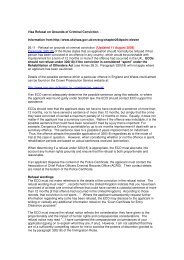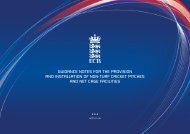Discipline Regulations and Guidelines - Ecb
Discipline Regulations and Guidelines - Ecb
Discipline Regulations and Guidelines - Ecb
Create successful ePaper yourself
Turn your PDF publications into a flip-book with our unique Google optimized e-Paper software.
<strong>Discipline</strong> <strong>Regulations</strong> <strong>and</strong><br />
<strong>Guidelines</strong><br />
Model <strong>Discipline</strong> <strong>Regulations</strong><br />
1. ECB Code of Conduct <strong>and</strong> Spirit of Cricket<br />
1.1 Code of Conduct<br />
1.1.1 The ECB is committed to maintaining the highest<br />
st<strong>and</strong>ards of behaviour <strong>and</strong> conduct. This Code of<br />
Conduct incorporates the Spirit of Cricket, as set out<br />
below. It applies to all matches played under the<br />
auspices of the ECB <strong>and</strong> may be applied to cricket<br />
in general.<br />
1.1.2 The captains are responsible at all times for ensuring that<br />
play is conducted within the Spirit of Cricket as well as<br />
within the Laws.<br />
1.1.3 Players <strong>and</strong> team officials must at all times accept the<br />
umpire’s decision. Players must not show dissent at the<br />
umpire’s decision or react in a provocative or<br />
disapproving manner towards another player or<br />
a spectator.<br />
1.1.4 Players <strong>and</strong> team officials shall not intimidate, assault or<br />
attempt to intimidate or assault an umpire, another<br />
player or a spectator.<br />
1.1.5 Players <strong>and</strong> team officials shall not use crude <strong>and</strong>/or<br />
abusive language (known as “sledging”) nor make<br />
offensive gestures or h<strong>and</strong> signals nor deliberately<br />
distract an opponent.<br />
1.1.6 Players <strong>and</strong> team officials shall not make racially abusive<br />
comments nor indulge in racially abusive actions against<br />
fellow players, officials, members <strong>and</strong> supporters. Clubs<br />
must operate an active open door membership policy<br />
whilst respecting player qualification regulations <strong>and</strong><br />
welcome players/members irrespective of ethnic origin.<br />
24<br />
<strong>Discipline</strong> <strong>Regulations</strong> <strong>and</strong> <strong>Guidelines</strong><br />
311
1.1.7 Players <strong>and</strong> team officials shall not use or in any way be<br />
concerned in the use or distribution of illegal drugs.<br />
1.1.8 Clubs must take adequate steps to ensure the good<br />
behaviour of their members <strong>and</strong> supporters towards<br />
players <strong>and</strong> umpires.<br />
1.2 Spirit of Cricket<br />
Cricket is a game that owes much of its unique appeal to<br />
the fact that it should be played not only within its Laws,<br />
but also within the Spirit of the Game. Any action which<br />
is seen to abuse this spirit causes injury to the game<br />
itself. The major responsibility for ensuring the spirit of<br />
fair play rests with the captains.<br />
1.2.1 There are two Laws which place the responsibility for the<br />
team’s conduct firmly on the captain.<br />
Responsibility of Captains<br />
The captains are responsible at all times for ensuring that<br />
play is conducted within the Spirit of the Game as well as<br />
within the Laws.<br />
Player’s Conduct<br />
In the event of any player failing to comply with the<br />
instructions of an umpire, criticising his decision by word<br />
or action, showing dissent, or generally behaving in a<br />
manner which might bring the game into disrepute, the<br />
umpire concerned shall in the first place report the<br />
matter to the other umpire <strong>and</strong> to the player’s captain,<br />
requesting the latter to take action.<br />
1.2.2 Fair <strong>and</strong> Unfair Play<br />
According to the Laws the umpires are the sole judges of<br />
fair <strong>and</strong> unfair play. The umpires may intervene at any<br />
time, <strong>and</strong> it is the responsibility of the captain to take<br />
action where required.<br />
312
1.2.3 The umpires are authorised to intervene in cases of:<br />
• Time wasting<br />
• Damaging the pitch<br />
• Dangerous or unfair bowling<br />
• Tampering with the ball<br />
• Any other action that they consider to be unfair.<br />
1.2.4 The Spirit of the Game involves RESPECT for:<br />
• Your opponents<br />
• Your own captain <strong>and</strong> team<br />
• The role of the umpires<br />
• The game’s traditional values<br />
1.2.5 It is against the Spirit of the Game:<br />
• To dispute an umpire’s decision by word, action<br />
or gesture<br />
• To direct abusive language towards an opponent<br />
or umpire<br />
• To indulge in cheating or any sharp practice, for instance<br />
a) appeal knowing the batsman is not out<br />
b) advance towards an umpire in an aggressive manner<br />
when appealing<br />
c) seek to distract an opponent either verbally or by<br />
harassment with persistent clapping or unnecessary<br />
noise under the guise of enthusiasm <strong>and</strong> motivation of<br />
one’s own side.<br />
1.2.6 Violence<br />
There is no place for any act of violence on the field<br />
of play.<br />
1.2.7 Players<br />
24<br />
<strong>Discipline</strong> <strong>Regulations</strong> <strong>and</strong> <strong>Guidelines</strong><br />
Captains <strong>and</strong> umpires together set the tone for the<br />
conduct of a cricket match. Every player is expected to<br />
make an important contribution to this.<br />
1.3 Failure to comply with the provisions of Paragraph 1 may<br />
lead to disciplinary action, irrespective of an alleged<br />
breach being related to a match not under the<br />
jurisdiction of the League.<br />
313
<strong>Regulations</strong> for Cricket Leagues<br />
2 Aims <strong>and</strong> Jurisdiction<br />
These regulations shall apply to any player who plays for<br />
any club at any level under the auspices of the ECB <strong>and</strong><br />
are intended to provide assistance <strong>and</strong> uniformity to all<br />
Clubs <strong>and</strong> Leagues in dealing with any alleged breach of<br />
the ECB Code of Conduct <strong>and</strong> Spirit of Cricket<br />
(Paragraph 1).<br />
It is intended that any breach of Paragraph 1 should in<br />
the first instance be dealt with by the player’s club who<br />
shall notify the Secretary of the League of the result of<br />
any action taken against its player.<br />
3 Procedure<br />
3.1 Any alleged breach of Paragraph 1 above shall be<br />
notified in writing (to be known as ‘a Complaint’) to the<br />
Secretary of the League <strong>and</strong>/or to the Chairman of the<br />
League or the Chairman of the League Disciplinary<br />
Committee.<br />
3.1.1 In the case of a registered player being the subject of a<br />
Complaint the Head of Non First Class Cricket to be<br />
advised immediately by telephone or email by the<br />
Secretary of the League <strong>and</strong>/or to the Chairman of the<br />
League or the Chairman of the League Disciplinary<br />
Committee.<br />
3.2 Upon receipt of such complaint, <strong>and</strong> as soon as<br />
reasonably practicable, the Chairman of the League or of<br />
the League Disciplinary Committee shall consider the<br />
complaint <strong>and</strong> resolve either:<br />
3.2.1 To take no action except to record the complaint <strong>and</strong><br />
notify the club; or<br />
3.2.2 To endorse the disciplinary action taken by the club; or<br />
3.2.3 To refer the matter for a Disciplinary Hearing which shall<br />
be convened by the Chairman of the League or of the<br />
League Disciplinary Committee as soon as practicable.<br />
314
4 Disciplinary Hearing<br />
4.1 In any case which is referred for a Disciplinary Hearing,<br />
at least seven days’ notice in writing of the hearing <strong>and</strong><br />
of the offence(s) alleged shall be given to the player, or in<br />
the case of a club, its Secretary.<br />
4.2 The Chairman of the League or of the League<br />
Disciplinary Committee shall convene a hearing as soon<br />
as is practicable <strong>and</strong> in any event within 21 days of the<br />
decision to refer. Any adjournments may be granted at<br />
the discretion of the Chairman of the Disciplinary<br />
Hearing.<br />
4.3 The player <strong>and</strong> club shall be entitled to attend the<br />
hearing, state their case (in the case of a club by its<br />
Secretary or other official), to be supported by a<br />
colleague <strong>and</strong> to call witnesses.<br />
4.4 The Hearing shall be conducted by the Disciplinary<br />
Committee of the League which shall consist of not less<br />
than three persons, none of whom shall be connected<br />
with the player, the club or their opponents at the time of<br />
the alleged breach.<br />
5 Penalties<br />
5.1 If at the hearing the Disciplinary Committee finds the<br />
alleged offence proved it shall have the power to impose<br />
one or more of the following penalties, together with<br />
such order as to costs as it deems appropriate:<br />
5.2 In the case of a player:<br />
5.2.1 To require the player to submit appropriate letter(s) of<br />
apology within a specified time.<br />
24<br />
<strong>Discipline</strong> <strong>Regulations</strong> <strong>and</strong> <strong>Guidelines</strong><br />
5.2.2 To record a reprim<strong>and</strong> <strong>and</strong> to give a warning as to future<br />
conduct.<br />
5.2.3 To impose a fine (Not to exceed £500).<br />
5.2.4 To suspend the player for one or more specified matches<br />
or for a stated period of time, unless in the case of a<br />
registered player. In cases where a registered player is to<br />
315
e penalised the committee should carefully consider<br />
whether a time or match ban is most appropriate <strong>and</strong> in<br />
any case no more than five specified days or matches<br />
can be levied.<br />
5.2.5 To deduct League points from the player’s team.<br />
5.2.6 To expel the player from the League.<br />
5.3 In the case of a club:<br />
5.3.1 To require the club to submit appropriate letter(s) of<br />
apology within a specified time.<br />
5.3.2 To record a reprim<strong>and</strong> <strong>and</strong> to give a warning as to future<br />
conduct.<br />
5.3.3 To impose a fine.<br />
5.3.4 To deduct League points from the club’s team(s)<br />
5.3.5 To relegate to any lower division of the League.<br />
5.3.6 To expel the club from any competition of the League.<br />
5.3.7 To expel the club from the League.<br />
5.4 The Disciplinary Committee shall have the power to<br />
suspend the operation of any part, or all, of the penalty it<br />
imposes for such period <strong>and</strong> subject to such terms <strong>and</strong><br />
conditions it deems appropriate.<br />
5.5 Decisions of the Disciplinary Committee (a finding that a<br />
complaint is proved or not proved or a decision on<br />
penalty) shall be by majority vote; where necessary the<br />
Panel Chairman shall have a casting vote.<br />
In the case of a registered player the result of the hearing<br />
should be communicated within 24 hours in writing,<br />
preferably by email, to the Head of non first class cricket,<br />
the PCA <strong>and</strong> County Cricket Club.<br />
6 Appeals Procedure<br />
6.1 A player or club shall have the right of appeal to the<br />
Appeals Committee. Notice of Appeal setting out the<br />
grounds must be given in writing to the Secretary of the<br />
316
League within seven days of the decision of the<br />
Disciplinary Committee, together with a deposit of £<br />
(to be set by the League).<br />
6.2 If Notice of Appeal is given the penalty shall not take<br />
effect pending the hearing of the Appeal, which shall<br />
take place as soon as is practicable.<br />
6.3 The Appeal shall be by way of re-hearing before a<br />
different Committee. The composition of the Committee<br />
shall be at the discretion of the Chairman of the League<br />
or of the League Disciplinary Committee <strong>and</strong> shall<br />
consist of not less than three persons, none of whom<br />
shall be connected with the player, the Club or their<br />
opponents at the time of the alleged breach. The player<br />
or club shall have the same rights of attendance <strong>and</strong><br />
representation, <strong>and</strong> to call witnesses as they had before<br />
the Disciplinary Committee.<br />
6.4 The Appeals Committee may confirm, vary or reverse the<br />
decision of the Disciplinary Committee <strong>and</strong> it shall have<br />
the power to increase the penalty <strong>and</strong> award costs of the<br />
Appeal hearing. Decisions of the Appeal Panel shall be<br />
by majority vote; where necessary, the Chairman shall<br />
have a casting vote.<br />
6.5 The decision of the Appeals Committee or, if no appeal,<br />
of the Disciplinary Committee, shall be final <strong>and</strong> binding<br />
unless in the case of a registered player, where the player<br />
may appeal to the Chairman of the Cricket <strong>Discipline</strong><br />
Commission who will consider the case under the Rules<br />
<strong>and</strong> <strong>Regulations</strong> of the ECB.<br />
<strong>Regulations</strong> for Clubs<br />
24<br />
<strong>Discipline</strong> <strong>Regulations</strong> <strong>and</strong> <strong>Guidelines</strong><br />
7 Internal Club Enquiry<br />
7.1 The club of its own volition <strong>and</strong> without any need for the<br />
receipt of a written complaint or other prompting shall,<br />
where any alleged case of conduct which is not fair <strong>and</strong><br />
proper occurs as stated in Paragraph 1 above, or<br />
otherwise as the club may think fit, forthwith convene an<br />
Internal Club Enquiry.<br />
317
318<br />
7.2 The purpose of the Internal Club Enquiry shall be to<br />
establish the facts <strong>and</strong>, where appropriate, to take the<br />
necessary disciplinary action so as to ensure that the<br />
club does not fail properly to control or discipline its<br />
player or players <strong>and</strong> to ensure that the club acts in a<br />
manner designed to protect the good name of the club<br />
<strong>and</strong> of cricket generally.<br />
7.3 Any player requested to attend such an Internal Club<br />
Enquiry, or any Appeal therefrom, shall be entitled to be<br />
accompanied at the Enquiry by a friend or other<br />
representative.<br />
8 Penalties<br />
8.1 If the Internal Club Enquiry finds the misconduct proved,<br />
the club shall have the following powers:<br />
8.1.1 To require the player to write letter(s) of apology within a<br />
specified time<br />
8.1.2 To record a reprim<strong>and</strong> <strong>and</strong> to give a warning as to future<br />
conduct.<br />
8.1.3 To impose a fine.<br />
8.1.4 To suspend the player’s right to be considered for<br />
selection by the club to play in one or more matches.<br />
8.1.5 To suspend the player’s membership of the club for a<br />
period.<br />
8.1.6 If the conduct constitutes gross misconduct the club<br />
shall have the power to terminate the player’s<br />
membership forthwith.<br />
8.2 The club for the same offence may, if it is thought fit,<br />
impose more than one of the above penalties.<br />
9 Appeals Procedure<br />
9.1 The player shall have the right to appeal to the President<br />
of the club or to the President’s nominee for a review of<br />
the findings of the Internal Club Enquiry <strong>and</strong> of the<br />
penalty or penalties imposed.<br />
9.2 The decision of the President or his nominee in all cases<br />
shall be final <strong>and</strong> binding.
<strong>Guidelines</strong> on the Conduct of<br />
Hearings <strong>and</strong> Appeals<br />
These <strong>Guidelines</strong> do not replace or form part of the<br />
Model <strong>Discipline</strong> <strong>Regulations</strong> which should be read<br />
carefully by all those falling under their jurisdiction.<br />
Natural Justice<br />
The rules of natural justice are the minimum st<strong>and</strong>ards of<br />
fair decision-making imposed on persons or bodies<br />
acting in a judicial capacity. The st<strong>and</strong>ard of proof shall<br />
be on the balance of probabilities rather than the criminal<br />
st<strong>and</strong>ard of beyond reasonable doubt. The rules of<br />
natural justice consist of the following elements:<br />
(i)<br />
The right to a fair hearing<br />
(ii) The rule against bias.<br />
1. The right to a fair hearing<br />
The right to a fair hearing requires that an individual shall<br />
not be penalised by a decision affecting his rights or<br />
legitimate expectations unless he has been given prior<br />
notice of the case against him <strong>and</strong> a fair opportunity to<br />
answer the case against him <strong>and</strong> to produce his<br />
own case.<br />
(a) Prior notice of the hearing<br />
The accused person should be given adequate notice of<br />
the allegations against him <strong>and</strong> of the procedure to be<br />
followed so that he may be in an position to make<br />
representations on his own behalf, to appear at the<br />
hearing, to prepare his own case <strong>and</strong> to answer the case<br />
against him. The time <strong>and</strong> location of the hearing must<br />
also be properly notified to the reported person.<br />
24<br />
<strong>Discipline</strong> <strong>Regulations</strong> <strong>and</strong> <strong>Guidelines</strong><br />
(b)<br />
Opportunity to be heard<br />
The reported person has a right to attend the hearing <strong>and</strong><br />
be allowed to present his case. If the Disciplinary Panel<br />
319
is satisfied that the reported person has been given<br />
adequate notice of the alleged breach <strong>and</strong> of the time<br />
<strong>and</strong> location of the hearing, they may allow the hearing<br />
to proceed if the reported person fails to attend.<br />
However, it may not be justifiable to proceed if the time<br />
or location fixed for the hearing is such that the person<br />
cannot reasonably be expected to attend. Within the<br />
Model <strong>Discipline</strong> <strong>Regulations</strong> it states that “at least<br />
seven days’ notice in writing of the hearing <strong>and</strong> of the<br />
offence(s) alleged shall be given to the player, or in the<br />
case of a club, its Secretary”.<br />
2. The rule against bias<br />
A person adjudicating on a dispute must have no<br />
pecuniary or proprietary interest in the outcome of the<br />
proceedings <strong>and</strong> must not reasonably be suspected, or<br />
show a real likelihood, of bias.<br />
The rule against bias also provides that a party should<br />
not normally be judged by his accuser.<br />
Conduct of Hearing<br />
Within these <strong>Guidelines</strong> words importing the singular<br />
shall include the plural <strong>and</strong> vice versa, <strong>and</strong> those<br />
importing the male shall include the female, <strong>and</strong> vice<br />
versa.<br />
1. A complaint is received by either the Chairman of the<br />
League or the Chairman of the League Disciplinary<br />
Committee who decides to refer the matter to a<br />
Disciplinary Hearing.<br />
2. The Hearing is conducted by a minimum of three <strong>and</strong> a<br />
maximum of five persons (the Panel) appointed by either<br />
the Chairman of the League or the Chairman of the<br />
League Disciplinary Committee. No-one connected with<br />
the individual or the club, or their opponents, or a club<br />
which might directly benefit from any disciplinary action<br />
(e.g. by the deduction of points), should be a member of<br />
the Panel.<br />
320
3. The accused person/club should be notified of the<br />
offence(s) alleged against him/them <strong>and</strong> the time <strong>and</strong><br />
location of the hearing. The notification should be in<br />
writing, include all relevant documentation <strong>and</strong> give at<br />
least seven days’ notice.<br />
4. The accused person is entitled to be supported by a<br />
colleague. There is no right to legal representation but<br />
the Panel would normally permit the accused person to<br />
be legally represented. However, the attendance or<br />
otherwise of the legal representative should not be used<br />
as a ‘delaying tactic’. In the case of a minor it is<br />
recommended that he should be supported by the<br />
County Board/League Child Welfare Officer or other<br />
appropriate adult.<br />
5. If the complaint has been made by the umpires, they<br />
should be available to give evidence at the hearing.<br />
6. Witnesses should not be present in the room at the<br />
outset but should be called in individually to give their<br />
evidence at the appropriate time. (Ideally, a separate<br />
waiting area should be provided for each party). It is<br />
recommended that in the case of a minor attending to<br />
give evidence on behalf of either party he should be<br />
supported by an appropriate adult.<br />
7. The Chairman should open the hearing <strong>and</strong> introduce all<br />
the parties. He should then briefly outline the procedure<br />
to be followed, specifying the st<strong>and</strong>ard of proof to be<br />
adopted.<br />
8. The charges against the accused person/club should be<br />
specified.<br />
9. Witnesses should be called individually <strong>and</strong> asked to<br />
give their evidence. The Panel may question the<br />
witnesses. The accused person (or representative)/club<br />
may question the witnesses.<br />
24<br />
<strong>Discipline</strong> <strong>Regulations</strong> <strong>and</strong> <strong>Guidelines</strong><br />
10. The accused person/club should be asked to give<br />
his/their account <strong>and</strong> may call witnesses. The Panel may<br />
question the witnesses.<br />
321
Once the witnesses have given their evidence <strong>and</strong><br />
answered any questions, they should either leave the<br />
room or, with the permission of the Chairman, they may<br />
remain but should take no further part in the hearing.<br />
11. The Panel may question the accused person/club.<br />
12. The Panel should deliberate in private. The Panel’s<br />
decision should be by majority vote; where necessary<br />
the Panel Chairman shall have a casting vote.<br />
13. The accused person/club should be called back in <strong>and</strong><br />
the Panel should give their decision as to whether the<br />
case is proved or not proved. If proved, the accused<br />
person/club should be asked to give any mitigation<br />
which might affect the Panel’s decision as to sentence,<br />
if they have any discretion in this area.<br />
14. The Panel should consider the sentence in private.<br />
15. The accused person/club should be called back in <strong>and</strong><br />
the Panel Chairman should announce the sentence. The<br />
accused person/club should be made aware of the<br />
Appeals Process, particularly the time within which an<br />
appeal should be lodged.<br />
16. The decision of the Disciplinary Panel <strong>and</strong> if appropriate<br />
the penalty should be communicated to the accused<br />
person/club in writing within 21 days.<br />
Appeals Process<br />
1. Notice of appeal against the decision of the Disciplinary<br />
Panel, whether as to verdict or sentence, to be given in<br />
writing to the Secretary of the League within 7 days of<br />
the decision of the Panel (together with a deposit of £X<br />
(to be set by the League) if appropriate). The notice of<br />
appeal should record the decision or part of the decision<br />
against which the appeal is made <strong>and</strong> the grounds <strong>and</strong><br />
basis of the appeal.<br />
322
2. Any penalty imposed by the Disciplinary Panel should<br />
not take effect until the appeal has been heard.<br />
3. The appeal must be heard by a different Panel from<br />
those who sat on the original Disciplinary Panel. The<br />
Appeal Panel must consist of not less than three people,<br />
none of whom should be connected with the individual<br />
or the club or their opponents, or a club which might<br />
directly benefit from any disciplinary action (e.g. by the<br />
deduction of points).<br />
4. An appeal against the verdict should take the form of a<br />
complete re-hearing. The accused person or club shall<br />
have the same rights of attendance <strong>and</strong> representation<br />
<strong>and</strong> the ability to call witnesses as they did at the first<br />
hearing.<br />
5. At an appeal against the sentence, the accused person<br />
or club shall have the same rights of attendance <strong>and</strong><br />
representation as they did at the first hearing.<br />
6. Decisions of the Appeal Panel shall be by majority vote<br />
with the Chairman having a casting vote where<br />
necessary. The decision of the Appeal Panel is final <strong>and</strong><br />
binding.<br />
7. The Appeal Panel can confirm the Disciplinary Panel’s<br />
decision, vary it or reverse it. It has the power to increase<br />
the penalty <strong>and</strong> award costs.<br />
8. The decision of the Appeal Panel <strong>and</strong> if appropriate the<br />
penalty should be communicated to the accused<br />
person/club in writing within 21 days.<br />
24<br />
<strong>Discipline</strong> <strong>Regulations</strong> <strong>and</strong> <strong>Guidelines</strong><br />
323
Sentencing <strong>Guidelines</strong> –<br />
Recreational Game<br />
The following are guidelines to sentencing policy which<br />
may be used by Disciplinary Panels in determining the<br />
appropriate sentence in any individual case. The<br />
guidelines provide a method of considering individual<br />
cases but are not a tariff <strong>and</strong> should not be considered<br />
as such. Only a Disciplinary Panel can decide on the<br />
penalty appropriate to any individual case.<br />
Players’ Behaviour<br />
In the event of any player failing to comply with the<br />
instructions of an umpire, criticising his decision by word<br />
or action, showing dissent, or generally behaving in a<br />
manner which might bring the game into disrepute, the<br />
umpire concerned shall in the first place report the<br />
matter to the other umpire <strong>and</strong> to the player’s captain,<br />
requesting the latter to take action.<br />
Breaches of paragraph 1.2.5 of the Spirit of the Game<br />
should automatically be reported as soon as reasonably<br />
practicable by the umpires to the executive of the club<br />
concerned <strong>and</strong> to any Governing Body responsible for<br />
the match. Such breaches will be treated seriously <strong>and</strong><br />
are likely to result in suspension.<br />
Accumulated Bad Behaviour<br />
Repeated infringements by an individual of the Spirit of<br />
the Game (where it is decided that each infringement in<br />
itself does not merit any immediate disciplinary action),<br />
should always result in a Disciplinary Hearing. Taking into<br />
account captains’ responsibilities as set out in paragraph<br />
1.1.2 of the Model <strong>Discipline</strong> <strong>Regulations</strong>, repeated<br />
infringements by a team are likely to result in the captain<br />
being held responsible for the conduct of his team<br />
(whether or not individual players are also identified for<br />
disciplinary action) <strong>and</strong> being called before a Disciplinary<br />
Hearing. The penalties available includes suspension.<br />
324
When issuing the penalty, the Disciplinary Panel may<br />
take account of instances of poor team discipline in<br />
previous years, particularly where the on-the-field<br />
captain is the same. Leagues shall ensure that captains<br />
underst<strong>and</strong> their responsibility for the “on the field”<br />
behaviour of themselves <strong>and</strong> their team members.<br />
If suspension is the penalty, this will normally take effect<br />
immediately.<br />
Violence<br />
There is no place for any act of violence on the field of<br />
play.<br />
Proven cases of violent conduct against an official will<br />
inevitably result in a lengthy term of suspension.<br />
Violence against a spectator or another player will also<br />
normally result in suspension, the length depending<br />
upon the circumstances.<br />
If suspension is the penalty, this should take effect<br />
immediately.<br />
Racial Abuse<br />
Players <strong>and</strong> team officials must not make racially abusive<br />
comments nor indulge in racially abusive actions against<br />
fellow players, officials, members <strong>and</strong> supporters.<br />
Racially abusive comments or actions will normally result<br />
in suspension, the length depending upon the<br />
circumstances.<br />
Drugs<br />
It is ECB’s policy that there should be no distinction<br />
drawn between ‘performance enhancing’ <strong>and</strong><br />
‘recreational’ drugs. Use or distribution of illegal drugs<br />
by players or team officials is a breach of the ECB Code<br />
of Conduct.<br />
24<br />
<strong>Discipline</strong> <strong>Regulations</strong> <strong>and</strong> <strong>Guidelines</strong><br />
325
Appropriateness of Penalties<br />
In all cases <strong>and</strong> for all offences, an admission of guilt will<br />
almost certainly result in a lesser sentence being<br />
imposed than if the matter is contested – credit being<br />
given for the admission. Plainly, the extent of the credit<br />
to be given will depend upon all the circumstances of the<br />
case, including how early the admission of guilt is made,<br />
but, save possibly in the most trivial of cases, it will not<br />
normally be such as to change the nature of the penalty<br />
or to bring about total suspension of the penalty.<br />
Whatever penalties are applied should be applied with<br />
consistency. Fines are normally more appropriate for<br />
individual breaches of regulations or the Code of<br />
Conduct. Points penalties are normally more appropriate<br />
in the case of a Club or where a significant number of the<br />
team have contributed to the breach.<br />
It is likely that cases of accumulated bad behaviour <strong>and</strong><br />
cases of violent conduct will result in a suspension of at<br />
least four weeks. Suspensions of four weeks’ duration<br />
should be reported by the League to their nominated<br />
County Board for national circulation. Players should<br />
underst<strong>and</strong> that suspensions of this length will normally<br />
apply to all cricket played under the auspices of ECB.<br />
Leagues should notify their nominated County Board of<br />
a four week suspension or above upon expiry of the<br />
seven day period within which notification of intent to<br />
appeal should be made or, in the case of an appeal,<br />
immediately upon conclusion of the appeal hearing.<br />
Leagues should notify Head of Operations – Non First<br />
Class Cricket within seven days of any disciplinary action<br />
taken against a registered player.<br />
326


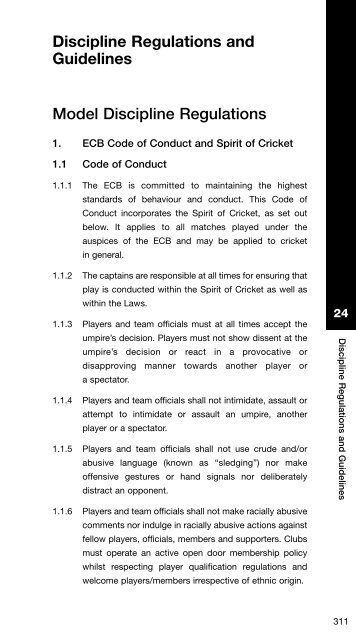
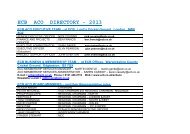
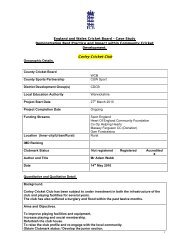
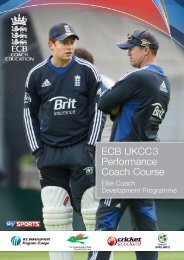

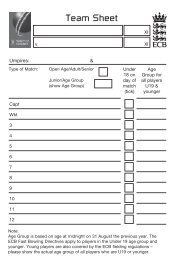
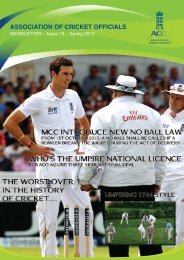
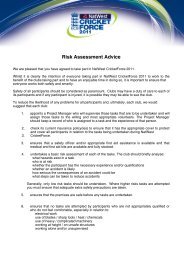
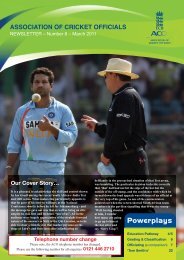
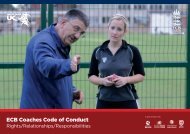

![Indoor Sports Halls with Cricket Provision [TS3] - Ecb - England and ...](https://img.yumpu.com/49070696/1/190x135/indoor-sports-halls-with-cricket-provision-ts3-ecb-england-and-.jpg?quality=85)
